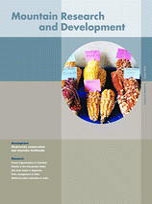The European Mountain Forum is the European section of the Mountain Forum, a global network committed to sustainable development in mountain regions. The specific objectives of the European Mountain Forum are
To promote sustainable development and management of European mountains and their environment.
To facilitate exchange between all parties involved.
To encourage education, training, public awareness, and technical assistance in all fields related to the first objective.
The European Mountain Forum was legally established and opened its coordination center in Switzerland in 1998. To date, general assemblies have been held in Liptovsky Milulas, Slovakia, in July 1999 and in Laissey, France, in May 2000. Further information on the history of the European Mountain Forum can be found on the EMF web site at www.europe.mtnforum.org.
A tool for exchange and information
The European Mountain Forum is a neutral, nonpolitical, nonsectarian, and nonprofit organization. Membership is free of charge. Electronic communication (e-mail and Internet) is the main tool of the European Mountain Forum, which also publishes a brief biannual newsletter for Internet nonusers.
French and English are both working languages of the European Mountain Forum, and multilingualism is encouraged. Exchange of information in local languages is facilitated through local nodes in each European mountain region.
Members can join the forum list, which allows them to take part in discussions by e-mail. Debates can be launched at any time and members are free to ask questions related to their research; they can also provide information about their activities.
A virtual library
Documents on sustainable development in European mountain regions, case studies, a calendar of Mountain Events (conferences, workshops, etc), and links to other organizations concerned with mountain issues are available in the Mountain Forum virtual library.
E-conferencing
Starting in 2000, the European Mountain Forum will organize electronic conferences specifically on European topics. A simple e-mail registration procedure allows those interested to participate in debates with international experts and highly qualified moderators.
Membership
Individuals and/or organizations can become associate members of the Forum, provided they subscribe to the Charter of the European Mountain Forum(code of ethics to be respected by the members of the Forum) and fill in a membership form. Detailed information and forms are available on the EMF web site.
Structure of the organization
At present, the European Mountain Forum has four local nodes: for the Carpathians, the Caucasus, the Mediterranean Mountains (including North Africa), and the Middle Mountains of Central and Western Europe. Further nodes should become operational in the near future for the Alps, the Northern European Mountains, the Pyrénées and Cantabrican Mountains, the Balkans, and the Ural.
Until the general assembly in 2001, which is scheduled to take place in Georgia, where new nodes may be incorporated, the European Mountain Forum will be governed by a board of nine representing
The five founding organizations,
- APAPMA, Associacio per a la proteccio dels animals, les plantes i el medi ambient, Andorra.
- ARPE, Agence Régionale pour l'Environnement Midi Pyrénées, France.
- CIAPP, Conseil International Associatif pour la Protection des Pyrénées.
- EUROMONTANA.
- The World Conservation Union (IUCN) European Programme.
- The four officially recognized local nodes mentioned above.
Martin Price (IUCN Europe) has been designated chairman of the board, while Delfi Roca (APAP-MA) is vice chairman and Miquel Rafa (Fundacio Territori y Paisatge, Catalunya, Spain) is the treasurer.
A growing network
Membership of the European Mountain Forum doubled from 1997 to 1998 and now exceeds 460 members. These numbers prove that there is a need for a network specifically devoted to the issue of sustainable development in European mountain regions.
Further information on the European Mountain Forum's structure and activities is available from the Administrator of the Coordination Center, François Mees.





